Civil Liberties, Human Rights, Torture, Truth to Power
Podcast: Play in new window | Download

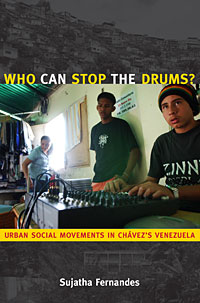
Who Can Stop the Drums?: Urban Social Movements in Chávez’s Venezuela
Who Can Stop the Drums?: Urban Social Movements in Chávez’s Venezuela is the title of Sujatha Fernandes’s new book. Sujatha is an author and assistant Professor of Sociology at Queens College and the Graduate Center, City University of New York. Her book looks at the transformations under way in Venezuela that are shaped by negotiations between the Chávez government and social movements using their own forms of historical memory and local organization. In her book, Sujatha shows everyday life and politics in the shantytowns of Caracas from the perspective of community-based radio, barrio assemblies, and the many interviews she conducted with activists and government officials. Most of the barrio activists in the book are Chávez supporters.
Sujatha Fernandes:
- There’s a real push back against neo-liberal reforms. Chavez who came into office in 1998, have been pursuing an anti-neoliberal agenda, trying to reverse the privatization and extend the social welfare net.
- The argument I make in the book is that Chavez has carved out a space within the global economy and Venezuela is a hybrid state containing both neo-liberal and anti-neoliberal elements.
- Who are these people, the large majority who live in the shanty towns, what do they think?
- The movements date back to before Chavez, the guerilla movements, cultural and community based groups. They trace their trajectory back to a long struggle in Venezuela. They’ve been reinvigorated by Chavez.
- The community based groups demand the very basics, running water, gas and electricity.
- Chavez in the middle between community groups and elite. Chavez has created institutions such as the missions, where some oil profits bypass the elite and toward community groups.
- I lived in a popular housing building, which are projects, (security problems, with gangs, violence and police)
- Bolivarian circles, Chavez’s first attempts to transfer power. 93 percent of Venezuelans are urbanized.
Guest – Sujatha Fernandes is Assistant Professor of Sociology at Queens College and the Graduate Center, City University of New York. She is the author of Cuba Represent! Cuban Arts, State Power, and the Making of New Revolutionary Cultures, also published by Duke University Press.
—-
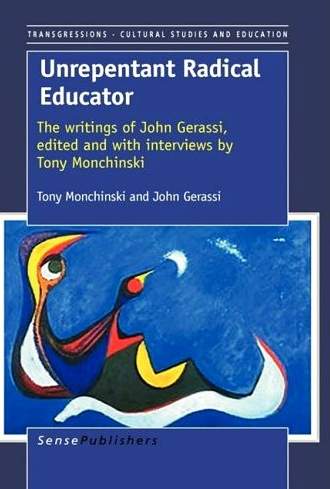
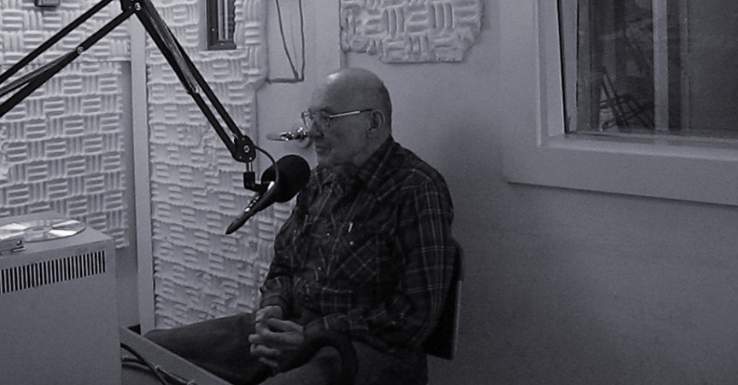
Unrepentant Radical Educator: The Writings of John Gerassi
We’re delighted to welcome back Professor John (Tito) Gerassi, once an editor at Time magazine, then at Newsweek. He obtained his PhD at the London School of Economics and Political Science. He is a long time civil rights and anti-war militant and author / editor of ten books plus scores of articles and pamphlets published on both sides of the Atlantic. He is currently Professor of Political Science at the City University of New York. We talk with Tito today about his recent book, Unrepentant Radical Educator: The writings of John Gerassi, edited and with interviews by Tony Monchinski (Transgressions: Cultural Studies and Education) Indypendent Book Review
The book joins personal narratives from Gerassi’s days of journalism and activism, featuring Che Guevara, Fidel Castro, Jerry Rubin, Eldridge Cleaver and others of the era, with essays on figures such as Sartre, Camus, and Julius and Ethel Rosenberg. One review writes, ( Especially fascinating are the tales of deliberate misreporting by the major media outlets for which he worked, epitomized by the words of owner Henry Luce when Gerassi was hired: “We here at Time believe that objectivity is neither feasible nor desirable.”)
John “Tito” Gerassi:
- Time Magazine: I hear you’re coming aboard Mr. Gerassi. In the long run, it was great that I got kicked out
- Met Che Guevara in Uruguay, as a journalist for the New York Times, there was a fight with anti-Castro students, the police were scared, one man fired his gun in the air, it ricocheted and hit and killed a USIS Cuban.
- Che told me I don’t talk to the imperialist press. At the hotel, they had reserved a large table where all the left-wing characters sat around with Che. Argentines say chez vous, that’s how Che got his nickname Che.
- The Great Fear in Latin America – John Gerassi
- Che Where Are You? Eventually there will be many Che’s.
Guest – Professor John Gerassi, once an editor at Time magazine, then at Newsweek, who obtained his PhD at LSE, is a long time civil rights and anti-war militant. He is the author or editor of ten books and scores of articles and pamphlets published on both sides of the Atlantic. He is currently Professor of Political Science at the City University of New York.
———————————————–
CIA Sponsored Terror, Civil Liberties, Criminalizing Dissent, Habeas Corpus, Human Rights, Surveillance, Torture, Truth to Power
Podcast: Play in new window | Download
Updates:
—-
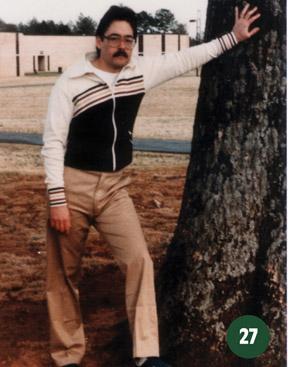

Puerto Rican Political Prisoner Released Today After 30 Years
Last week Puerto Rican community activist Carlos Alberto Torres was released from a federal prison in Pekin, Ill after serving 30 years as a political prisoner. Torres was convicted of seditious conspiracy – conspiring to use force against the lawful authority of the United States over Puerto Rico. Torres was punished for being a member of an armed clandestine organization called the FALN – Fuerzas Armadas de Liberación Nacional (English: “Armed Forces of National Liberation) which had claimed responsibility for bombings in Chicago that resulted in no deaths. He wasn’t accused of the bombings only of being a member of FALN.
In 1898 Puerto Rico was ceded to the US by Spain as war bounty in the treaty that ended the Spanish-American War. Still, the US has occupied it since. Torres was sentenced to 78 years in prison but used international law in his defense. Torres argued that the courts of the colonizing country may not criminalize captured anti-colonial combatants, but must turn them over to an impartial international tributnal to have their status adjudicated.
There was an outpouring of support to free Carlos. His attorney, National Lawyers Guild member Jan Susler of Chicago, notes, “Carlos is being released from prison due to the unflagging support of the Puerto Rican independence movement and others who work for human rights. The more than 10,000 letters of support from the U.S., Puerto Rico, Mexico and other countries sent a strong message to the Parole Commission.”
Jan Susler:
- Carlos got a disproportionate sentence, a punishment for who he was politically. He did 30 years, standing tall and maintaining his political integrity.
- People stop him on the street, and embrace him.
- The bombing in which he was accused of was only property damage. If he had killed or injured someone and convicted as a social prisoner, he would gotten a less sentence and served far less time.
- He was always treated more harshly than the other prisoners.
- Right after 9/11, the US rounded up political prisoners and put them in the hole for months.
- You’re always watched, you’re always monitored. Every prisoner has access to email, Carlos did not.
Carlos Torres:
Guest – Attorney Jan Susler joined People’s Law Office in 1982 after a six year stint as Clinical Law Professor at Prison Legal Aid, the legal clinic at Southern Illinois University’s School of Law. Her long history of work on behalf of political prisoners and prisoners’ rights includes litigation, advocacy and educational work around USP Marion and the Women’s High Security Unit at Lexington, KY. Her practice at PLO focuses on police misconduct civil rights litigation, which has lately included wrongful conviction litigation on behalf of people exonerated after serving many years in prison, innocent. Her work with the Puerto Rican Independence Movement and with progressive movements challenging U.S. foreign and domestic policies has been a constant throughout her 30 years as a lawyer.
Guest – Carlos Alberto Torres member of Puerto Rico’s independence movement and the longest-serving Puerto Rican political prisoner. He was convicted and sentenced to 78 years in a U.S. federal prison for seditious conspiracy – conspiring to use force against the lawful authority of the United States over Puerto Rico. He served 30 years, being released on July 26, 2010.
—-
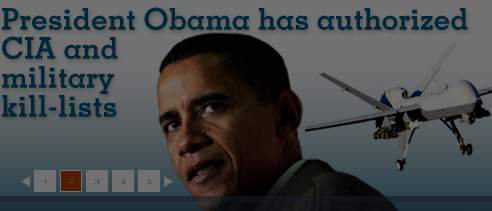
CCR and ACLU Sue Obama Over Limits On Lawyers Seeking To Represent Suspect on Administration “Kill List”
The Center for Constutional Rights and the ACLU have filed a lawsuit challenging the Obama administration’s authority to use the military and the CIA to kill the radical Muslim cleric Anwar al-Awlaki. He’s an American citizen, accused of terrorism but hasn’t recieved a trial. He is believed to be hiding in Yemen. Because it would be against the law to challenge the government’s attempt to kill al-Awlaki, the lawsuit was filed against the Treasury department, that challenged a regulation that would require the Center and the ACLU to obtain its permission in order to provide uncompensated legal services for Mr al-Awlaki.
Vince Warren, the executive director of the Center for Constitutional Rights, argued that international law did not permit a government to kill people far from combat zones, and in the case of a US citizen, Vince said that such a policy also violates the Constitution’s Fifth Amendment — and is a dangerous precedent.
CCR Attorney Pardiss Kebriaei:
- The case that we filed last week was a challenge to a regulatory scheme under the Department of Treasury and OFAC which prohibits transactions with anyone designated as a terrorist by the government. That includes pro-bono legal services.
- Al-Awlaki is the subject of an assassination order by the president, ordering and authorizing the CIA and Special Forces to target and kill him.
- OFAC powers go back to the 1970s IEEPA, the International Emergency Economic Powers Act.
- All we have against this guy are allegations.
- The CIA, which is one of the agencies that carries out these killings has primarily used drones. We think that drones would be the primary way that this killing would be carried out.
Guest – CCR staff attorney Pardiss Kebriaei joined the Guantánamo Global Justice Initiative at the Center for Constitutional Rights (CCR) in July 2007. She provides direct representation to several of CCR’s clients at Guantánamo and helps coordinate CCR’s network of hundreds of pro bono counsel representing other prisoners. She also focuses on using international human rights mechanisms to bring international pressure to bear on the U.S. government and hold other governments accountable for their role in the violations at Guantánamo.
———-
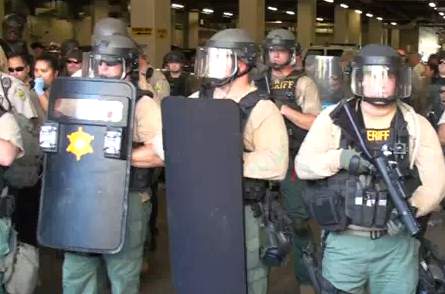
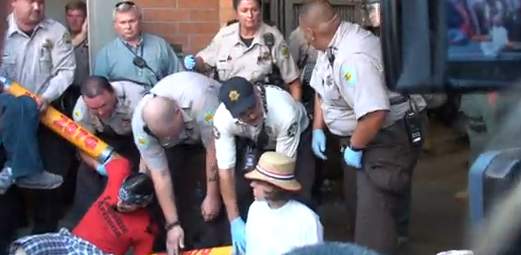
CCR Attorney Legal Observer Arrested in Arizona Immigration Protests
Legal observers from the National Lawyers Guild and the Center for Constitutional Rights were arrested last week during mass demonstrations of protesters who opposed Federal law 287G, Arizona law SB 1070. What happened? CCR Legal Director Bill Quigley told the media, Arizona is starting to act like Mississippi in the civil rights days. Among those arrested were National Lawyers Guild officer Roxana Orrell and CCR staff attorney Sunita Patel.
Sunita Patel:
- It was my first time in Maricopa County. Sheriff Joe Arpaio is known for branding the most horrible incarnation of 287G and ICE police collaboration.
- 287G is the statute by which this program is authorized by Congress. He also has what’s called a secure communities program which allows for the identification of anyone who is a non-citizen through a finger printing system. 287G allows for local agencies to implement immigration law through a memorandum of understanding with the federal government.
- At the same time he implements what’s called “crime suppression sweeps” Where he takes his units and regular citizens to sweep through neighborhoods.
- I spent the night in jail, I hadn’t planned on it. It was really an honor to be in solidarity with the rest of the protesters. I was charged with obstruction of a highway and public thoroughfare and failure to obey a police officer. People in Arizona call it a war zone when it comes to immigration enforcement.
- Arizona has also become the site for a spark of incredible activism and the growth of an incredible human rights movement.
Guest – CCR Staff Attorney Sunita Patel with racial profiling, immigrant rights and other human rights litigation. Prior to her position at CCR, she held a Soros Justice Fellowship at The Legal Aid Society, Immigration Law Unit in New York where she represented immigrant detainees in removal proceedings and worked with criminal justice and human rights groups to create independent community oversight for detention operations through public accountability boards. Sunita is a former law clerk for the Honorable Judge Ivan L. R. Lemelle in the Eastern District of Louisiana.
————————————————————————————————
Civil Liberties, Gaza, Habeas Corpus, Human Rights, Targeting Muslims, Truth to Power
Podcast: Play in new window | Download
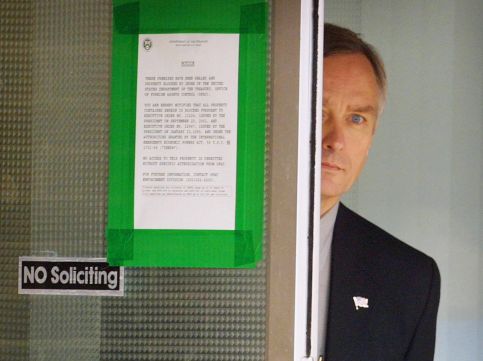
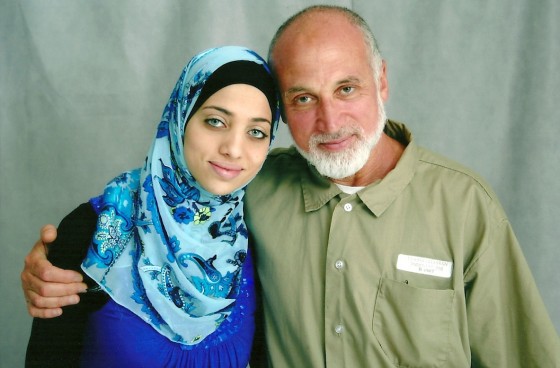
Holy Land Foundation Case Update
Hosts talk with Noor Elashi, Noor is the daughter of Holy Land Foundation prisoner Ghassan Elashi. Ghassan is currently being held in the Communications Management Unit in Marion, Illinois and has now had his visitations canceled. Noor says visitations have been cruelly obstructed by a Texas prison guard while at the prison in Seagoville Texas in October 2009. Noor’s brother Omar is 9 and has Down’s syndrome, during a visitation, Omar ran up to his father to give him a hug and the guard says “What Mr. Elashi, you think you’re an exception?” After the visit, the guard filed a complaint against Ghassan for not following instructions. The same prison guard during Thanksgiving that year, prevented his sons from entering the room during a visit. Ghassan called the guard evil and compared him to a guard at Abu Ghraib. The guard filed another complaint. After an internal investigation, Ghassan’s visitations were banned for 6 months. The visitation doesn’t usually apply when an inmate transfers to another prison, but when Ghassan was transferred to the CMU in Marion, the visitation ban was upheld. www.Freedomtogive.com
As many listeners may know, Holy Land Foundation was the largest Muslim charity in the United States, the Bush administration shut it down after the September 11th attacks, and arrested five people from the charity. During the trial, the prosecution used unrelated video of suicide bombers to emotionally sway the jury.
Noor Elashi:
- Book in progress: Eyes Like My Father, A Daughters Narrative of Displacement
- Father was sentenced to 65 years in prison for giving material support in the form of humanitarian aid to Zakat committees – Palestinian charities in the West Bank and Gaza, that prosecutors were alleging were fronts for Hamas.
- These are the very same Zakat committees that USAID, the Red Cross and UN NGOs were giving money to.
- The Holy Land Foundation, co-founded by Ghassan Elashi, was the largest charity in the US until the Bush Administration with an executive order shut it down 3 months after 9/11.
- The material support law is a very flawed law and singles out Muslim charities and with the recent upholding of the material support law by the Supreme Court, I feel that Americans are at risk.
- There were 2 trials (for Ghassan Elashi) the first in 2007 which looked at the Zakat committees. Jury deadlocked on most counts against the HLF. The prosecution showed the jury scenes of terrorism, buses being blown up expecting the jury to be prejudiced by seeing this and convict Ghassan Elashi, and they didn’t.
- In the second trial, the prosecutors were more aggressive, the defense attorneys, families and civil libertarians around the world were flabbergasted, when the jury delivered all guilty verdicts after 9 days of deliberation.
- Trials took place in Dallas, Texas. Ghassan Elashi, Noor’s father and the CEO of the Holy Land Foundation recieved a 65 year sentence. Other fund raiser reps were sentenced between 15 and 20 years.
- Ghassan Elashi currently in a CMU – Communications Management Unit in Marion, Ilinois – termed “little Guantanamos.”
- As far as visitations go, those in and of themselves are cruel and unusual punishment because you travel all that way and you can’t touch, there is a plexi-glass between you and its monitored live in Washington DC.
- Four of the defendants are being held in CMUs, 2 in Marion, Illinois and 2 in Terra Haute, Indiana.
- My father is hopeful and optimistic, he does yoga and pilates, reads the Quran.
- It was New York Senator Chuck Schumer who co-authored the anti-terrorism law in 1996 that strengthened the material support provision.
- I’m the eldest of 3 boys and 3 girls. It’s a double tragedy, these convictions that were made possible by “fear” in the courtroom and the 65 year sentence. Appeal: they have until August 3 to file briefs.
- Humanitarian Law Project Supreme Court Case upheld the material support provision.
- During both trials, the prosecutors brought in an anonymous Israeli intelligence officer who testified under a fake name. He said could smell Hamas.
- During the testimony, the court benches were cleared except for the family.
- Michael Ratner: After 9/11 they made it extremely dangerous to give money to Muslims anywhere in the world.
- Everybody is at risk at this point, even Jimmy Carter
Guest – Noor Elashi, the daughter of Holy Land Foundation prisoner Ghassan Elashi. She is a writer based in Dallas, Texas. After receiving a Bachelor’s degree in journalism from the University of North Texas, she worked for the Fort Worth Star-Telegram. In July 2008, she won the 3rd place Mayborn Literary Nonfiction Award for her manuscript titled “Displaced,” which she plans to expand into a memoir about the displacement of three generations of Palestinians: her grandmother, father, and herself. She can be reached at noorelashi@gmail.com.
——
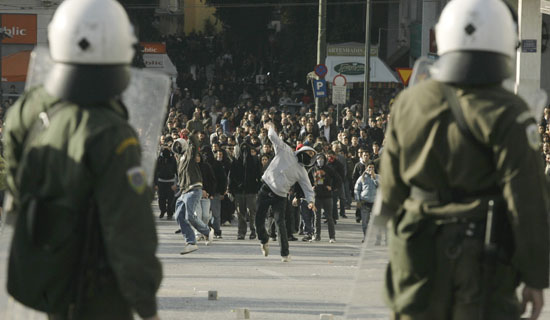
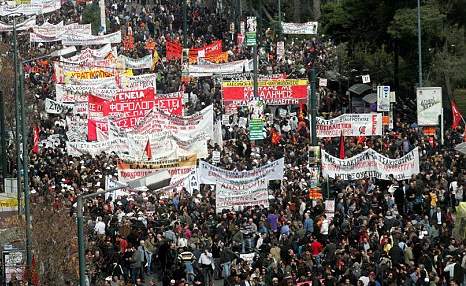
Austerity: Why and for Whom? – Rick Wolff
We are very pleased to have with us Professor Rick Wolff to update us on where we’re in this ongoing global capitalist crisis. Austerity has appeared in the titles of many recent articles on the global capitalist crisis. What is it? Rick Wolff writes in his article titled Austerity: Why and for Whom? the efforts to broaden the recovery beyond one year have failed and that failure has cost Washington trillions in borrowed funds from lenders. Those lenders now demand guarantees that those loans will be repaid to them with interest. The guaranteed demanded by lenders is “austerity.” To collect this austerity, the banks (lenders) want governments to raise taxes or cut government spending or both. Economic Recovery for the Very Few by Rick Wolff. An extreme burden imposed on the global economy. Rick asks, Why not collect austerity from tax exempt multinational corporations, churches and private institutions?
Professor Rick Wolff:
- Governments around the world borrowed enormous amounts of money, never seen before surge of borrowing. The urgency of the second impending crisis of capitalism, the second major collapse of capitalism in 75 years was so intense, the terror in the ranks of business was so complete, that nobody stopped to worry, just lend us lots of money, take toxic assets off our books and so on.
- Suddenly, the creditors who are lending to the governments are beginning to get nervous. They’ve been going to the governments and saying we don’t want to be stuck with a debt that your people might not pay back.
- Lenders: You either have to raise taxes on your people, save it and put it into a special account which will only be used to pay us interest on the principle or you cut your programs, your public services and put that into the same account.
- The name of the government’s response to the demand of its creditors is “austerity.” Imposing on society a severe regimen of rising taxes, or cut government spending to please and satisfy creditors.
- Yale, a multi-billion dollar corporation with billions of annual income, pays no taxes. Rather than increase the taxes of individual persons, why don’t we do what should have done long ago.
- Take a look at California, they’re laying thousands and thousands of state employees.
- No Economic Crisis: Annual world wealth report, the income of the top wealthiest people 2009 rose 17 percent.
- Banks are the buyers of government debt. The bankers produce a crisis, the government bails them out. The government borrows from the banks to bail them out. The bankers know there is popular opposition.
- French action against austerity: trade unions organizing general strike which will close everything in September in France. Will the pressure rise within US politicians to re-negotiate this debt?
- The state of Oregon, the democratic party controls both houses of legislature. To pay for the 700 million dollar gap over a 2 year period they raised taxes on business and wealthy people.
Guest – Richard D. Wolff is Professor of Economics Emeritus, University of Massachusetts, Amherst where he taught economics from 1973 to 2008. He is currently a Visiting Professor in the Graduate Program in International Affairs of the New School University, New York City. He also teaches classes regularly at the Brecht Forum in Manhattan.
CIA Sponsored Terror, Civil Liberties, Criminalizing Dissent, Guantanamo, Habeas Corpus, Human Rights, Targeting Muslims, Torture, Truth to Power
Podcast: Play in new window | Download
Updates:
———-
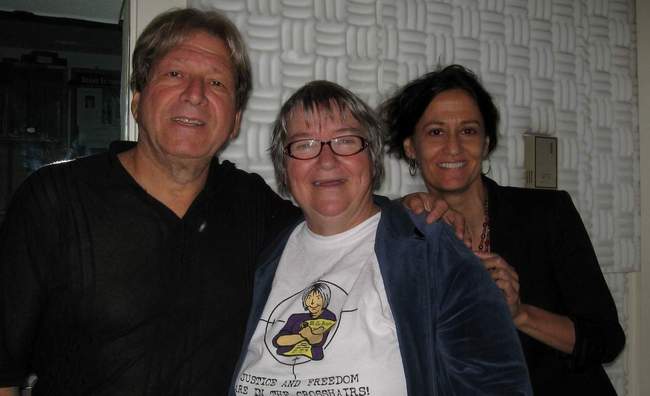
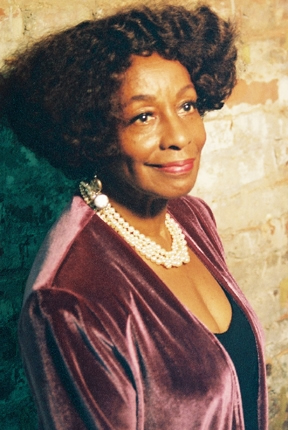
Lynne Stewart Heard A Death Sentence Today
As many listeners know Judge John G Koeltl sentenced defendant, Lynne Stewart: 120 months incarceration in the Danbury Federal Correctional Institution Connecticut on five counts to be served concurrently. Lynne Stewart is 70 years old, she’s a breast cancer survivor with other pending health issues. We’re joined by Vinie Burrows today, she is the UN representative for the Women’s International Democratic Federation and the founding member of the Granny Peace Bridgade. Vinie Burrows made powerful statements in her article titled Lynne Stewart Heard A Death Sentence Today that calls terrorism by its real name under the draconian Patriot Act.
Vinie writes, “over and over again in his remarks leading up to the sentencing, Judge Koeltl used the term “terrorist enhancement.” Those warning words bring up the specter of some of the nastiest aspects of the Cold War and its present re-incarnation in the Patriot Act which by expanding law enforcement’s surveillance and investigative powers represents a significant threat to civil liberties. Read the official text… “Uniting and Strengthening America by providing Appropriate Tools Required to Intercept and Obstruct Terrorism. The Sentencing of Lynne Stewart by Michael Steven Smith.
Vinie Burrows:
- Being at Lynne Stewart’s court hearing was useful to see the judge, to see the players, the 2 prosecuting lawyers and to see Lynne Stewart who made a marvelous opening statement. It was one of the great speeches before the bar
- I felt as he was reading, Judge Koeltl was responding to each dictate of the appellate court.
- We have to define terror. We can’t go by what the legislative, judicial and now executive define as terror. We’re looking in the wrong places for terror. A single mother with 3 children living in a shelter, she knows terror. When she doesn’t know where her next meal is coming from, that’s terror.
- When her home is foreclosed on, that’s terror, and of course our banks are the biggest terror of all.
- We can’t even think of Lynne Stewart when we talk of terror, she is a human rights defender. She’s been deprived of the ability to defend human rights.
- I think we have to go to “who are the terrorists?” who are the victims of terror?
- We have to talk about the state, the state usually the perpetrator of human rights violations.
- The state must recognize that poverty is a weapon of mass destruction.
- I think we need to talk about the Universal Declaration of Human Rights as a legal basis to mount some sort of appeal.
- Michael Ratner: This is the Time of the Toad (A Study of Inquisition In America)
- Lynne Stewart has another appeal against this severe sentence.
Guest – Vinie Burrows is an award-winning Broadway actress. She has been active at the United Nations Economic and Social Council on the issues of the status of women and Southern Africa. Burrows won the Paul Robeson Award in 1986. She was to appear in a show titled Sister! Sister! at the University of Delaware in Newark in November 1991. She was to be a panelist in the 2000-2001 African Diaspora lecture series at the Center for Ideas and Society in Riverside, California.
——–


Mountain Top Removal Activists Arrested For Direct Action In Virginia (Updated)
Last week 4 activists with Climate Ground Zero and Mountain Justice were arrested for using direct action to shut down a coal mining mountaintop removal effort in Virginia. Two of the 4 activists locked themselves to heavy machinery in the coal mining pit and were later arrested. The activists say they are drawing public attention to the dangers associated with the Brushy Fork Sludge Impoundment, which contain up to 8 billion gallons of toxic coal waste. The area is unstable, Brushy Fork’s foundation is built on a honeycomb of abandoned underground mines. If the foundation were to collapse, as others have, the toxic slurry could engulf communities nearly 14 miles away, according to Marfork Coal Co.’s emergency warning plan. Meanwhile, one of the activists, Jimmy Tobias was still in jail during this interview and is now released.
Dea Goblirsch:
- Mountain top removal is a destruction form of coal mining that uses explosives, that blow up the tops of mountains to get to the coal seams beneath. It’s cheaper and more efficient than underground mining, it also employs fewer miners.
- So far there have more than 800 miles of peaks flattened. They also take the rubble from the tops of mountains and dump it into nearby valleys. They are called valley fills. The creation of the valley fills cover up the headwater streams.
- A lot of these valleys feed into water systems that supply water to the Eastern United States.
- Brushy Fork is the largest earthen dam in the Western Hemisphere.
- Coal River Mountain was the highest elevation in the area that hadn’t been mountaintop removal mined.
- You can’t always see mountain top mining from the roadside, they tend to keep a veil of trees.
- The work we’re doing is primarily civil disobedience and direct action. Tree sits within the blast range. Bails and sentencing are widely uneven.
- Community groups to start sustainable energy initiatives in Appalachia, we see this happening in Kentucky, and Virginia and other parts of the coal mining region.
- A woman publicly slapped Judy Bonds, the director of Coal River Mountain Watch.
- A strip miner threatened to slit the throat of a child
—–
Katie Huscsza:
- We attached ourselves to the high wall miner (equipment) for 4 hours.
- Me and Colin were charged with trespassing, conspiracy and obstruction.
- There are around 30 people this summer actively working to stop mountain top removal.
- We I first learned about it (MTR) I almost didn’t believe that something so awful and destructive could be taking place
—–
Guest – Dea Goblirsch with Climate Ground Zero and Katie Huscsza, also with CGZ had locked herself to highwall coal mining machines, arrested and released on bail.
Music interludes in this segment by Canton Becker
——————————————————————————–
Civil Liberties, Criminalizing Dissent, Habeas Corpus, Human Rights, Iraq War, Supreme Court, Targeting Muslims, Torture, Truth to Power
Podcast: Play in new window | Download
Updates:
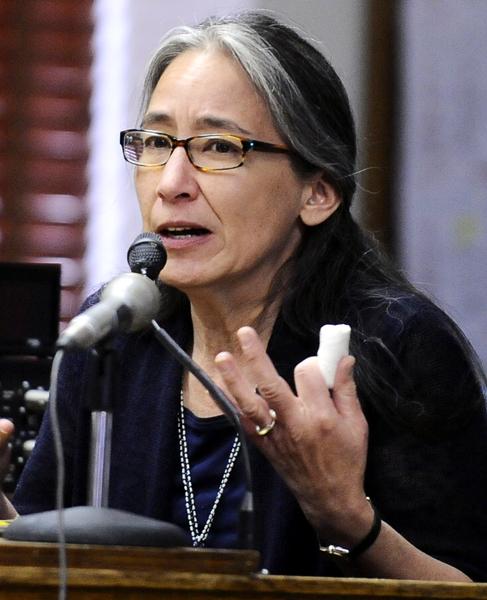
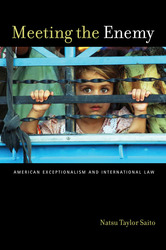
Natsu Saito, Meeting the Enemy: American Exceptionalism and International Law
Meeting the Enemy: American Exceptionalism and International Law is the title of Natsu Saito’s recent book, Natsu is an attorney and professor of Law at Georgia State University’s College of Law in Atlanta. The book boldly points out how the United States violated international law since its declaration of independence. As often discussed here on Law and Disorder, international courts and institutions have been at the forefront of holding the torture conspirators accountable. Meeting the Enemy gives disturbing insight into the origins of American exceptionalism.
Natsu Saito:
- The duality is that the US does exempt itself (from international law) very consistently and very frequently and yet promotes international law very strongly and relies upon it.
- It has relied upon certain premises that are fundamental to the whole outlook and paradigm of colonialism – which is that there is a higher good, a more civilized approach the US embodies.
- The law doesn’t apply because we have a higher aim of civilization and that justifies not playing by the rules.
- The United States making others comply with human rights standards while exempting itself.
- Moving humanity toward this higher goal is so critical because if you strip that away and you look at the realities on the ground, you see what has been termed Western civilization has been incredibly barbaric.
- In order to get around that analysis, you have to say it was for a higher good.
- I think the “left” tends to accept the general framework, and to make particular criticisms of policies and practices that are obviously problematic. The US government engaging in torture for example, but each instant is accepted as anomalous instead of the larger picture.
- It is too frightening even for the people on the left to deal with the reality that this is a country that sits on occupied land, illegally occupied by its own rules. People on the left want to make it a kinder, gentler colonialism.
- I started out thinking I was writing a book about the failure of the United States failure to comply with international law, as I got into it, the more interesting questions were the push / pull dynamics between reliance on international law
- The current system of international law evolved from the international law which was the agreement between the European colonial powers of how they were not going to destroy each other in the process of taking over the rest of the world.
Guest – Natsu Taylor Saito teaches international law and human rights, race and the law, immigration, criminal procedure, and professional responsibility, and is an advisor to the Asian American Law Student Association and the Hispanic Student Bar Association. Professor Saito’s scholarship focuses on the legal history of race in the United States, the plenary power doctrine as applied to immigrants, American Indians, and U.S. territorial possessions, and the human rights implications of U.S. governmental policies, particularly with regard to the suppression of political dissent. Read more.
——-
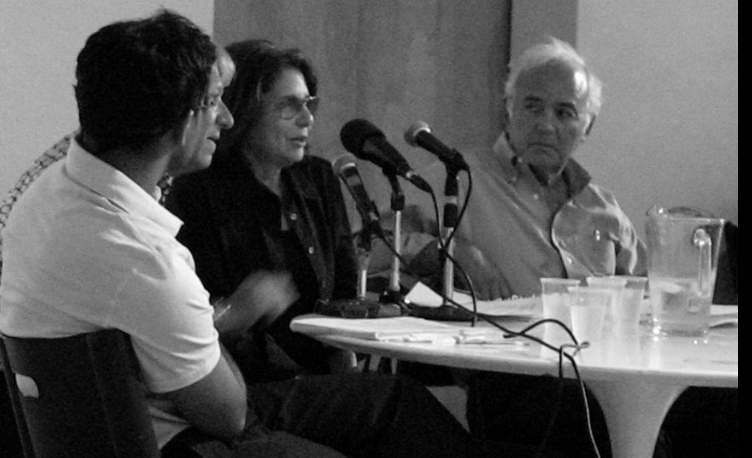
Elena Kagan and the Supremes – Brecht Forum
We hear excerpts from a discussion on the confirmation hearings of Elena Kagan, and how her position may influence the direction of the Supreme Court.
Panelists:
Martin Garbus – one of the country’s leading trial lawyers. Mr. Garbus aggressively represents his clients in the courts and in the media. He has appeared before the United States Supreme Court as well as the highest state and federal courts in the nation. His devotion to ethics, justice and the law has earned him respect among the legal community and beyond as well as prominent awards. Time Magazine has named him “legendary . . . one of the best trial lawyers in the country,” while Newsweek , the National Law Journal and other media agree that Mr. Garbus is America’s “most prominent First Amendment lawyer,” with an “extraordinarily diverse practice.” The National Law Journal named him one of the country’s top ten litigators.
Margaret Ratner Kunstler – former Educational Director at the Center for Constitutional Rights. She’s an attorney and leads the New York City chapter of the National Lawyers Guild and heads the William Moses Kunstler Fund for Racial Justice.
Anand Swaminathan – an associate at Vladeck, Waldman, Elias & Engelhard, P.C. He graduated from the University of Wisconsin in 2001 and the Harvard Law School in 2006. Prior to joining Vladeck he was a law clerk for the Honorable Theodore H. Katz of the United States District Court for the Southern District of New York.
Michael Steven Smith – Law and Disorder co-host, author and New York attorney. Michael Steven Smith is the author, editor, and co-editor of six books, including “The Emerging Police State,” by William M. Kunstler. He has testified before committees of the United States Congress and the United Nations on human rights issues. Mr. Smith lives and practices law in New York City with his wife Debby, where on behalf of seriously injured persons he sues insurance companies and occasionally the New York City Police Department.
———————







